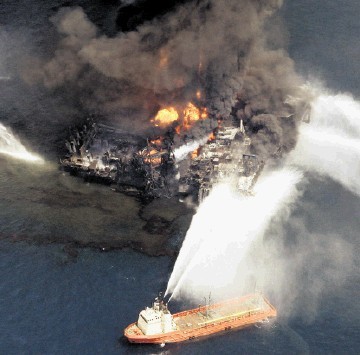
Oil giant BP has been accused of putting speed before safety in the run-up to the Gulf of Mexico rig disaster because it was massively over budget on the project.
On the first day of a trial which will decide on billions of dollars in compensation claims over the worst offshore oil spill in American history, a lawyer said company executives applied “huge financial pressure” on drilling managers.
Jim Roy, representing individuals and businesses affected by the spill, said BP wanted to “cut costs and rush the job” before the blowout of its Macondo well triggered the explosion.
The project was more than $50million – about £35million – over budget and behind schedule at the time of the blowout, Mr Roy said.
He told the US Federal Court in New Orleans that BP “repeatedly chose speed over safety” and claimed the spill also resulted from Swiss-based rig owner Transocean’s “woeful” safety culture.
The trial will apportion blame and determine how much more BP and other companies involved should pay for their role in the disaster.
US district judge Carl Barbier heard opening statements by lawyers for the companies, federal and state governments and others who sued over the 2010 incident which left 11 rig workers dead.
The trial is designed to identify the causes of BP’s well blowout and assign percentages of fault to the companies.
BP has already incurred more than $24billion – £16.5billion – in spill-related expenses and has estimated it will pay a total of £29billion to fully resolve its liability for the disaster, which spewed millions of gallons of oil over months.
But trial lawyers for the federal government and America’s Gulf of Mexico states and for private plaintiffs hope to convince the judge that the company is liable for much more.
In December Judge Barbier gave final approval to a settlement between BP and Plaintiffs’ Steering Committee lawyers representing Gulf Coast businesses and residents who claim the spill cost them money.
BP estimates it will pay roughly $8.5billion – £5.8billion – to resolve tens of thousands of these claims, but the deal does not have a cap.
BP resolved a government criminal probe by agreeing to plead guilty to manslaughter and other charges and pay £2.75billion in criminal penalties.
Transocean reached a separate settlement with the government.
But there is plenty left for the lawyers to argue about at trial, given that the federal government and Gulf states have not resolved civil claims against the company.
The Justice Department and private plaintiffs’ lawyers have said they would prove BP acted with gross negligence.
BP’s civil penalties would soar if the judge agrees with that claim.
BP, meanwhile, argues the federal government’s estimate of how much oil spewed from the well – more than 200million gallons – is inflated by at least 20%. Pollution penalties are based on how many barrels of oil spilled.